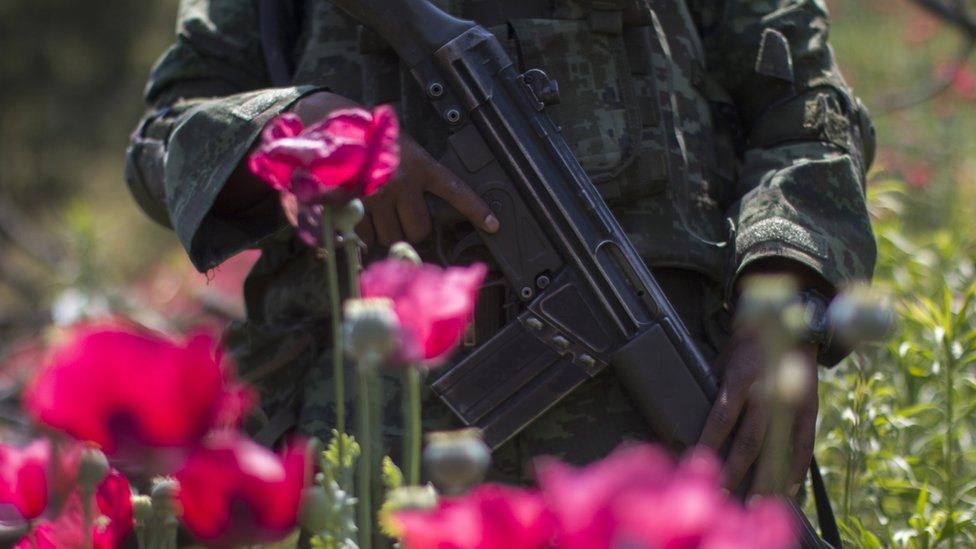Mexico candidate López Obrador thrives on promise of change
- Published
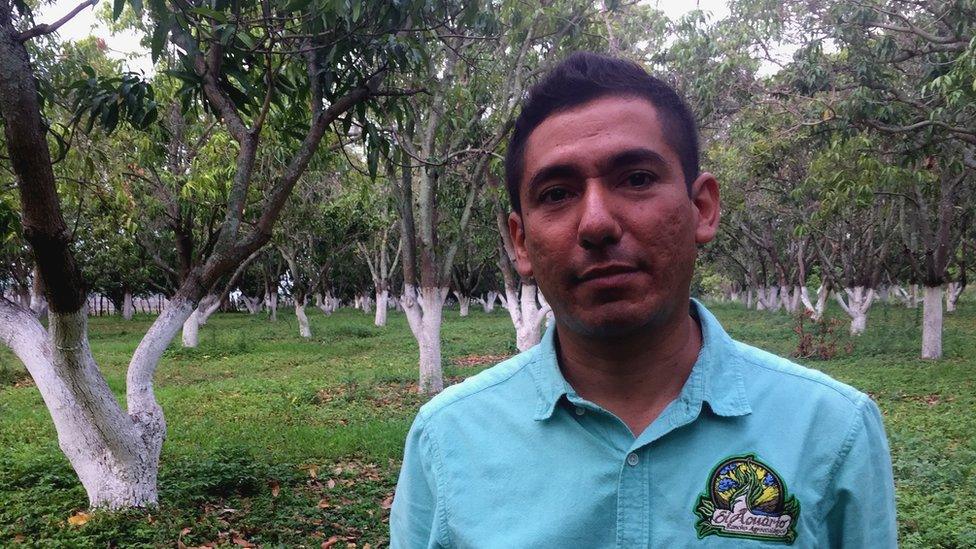
Gilberto García says he has received no help from the current government
The mangoes on Gilberto García's farm are ripening beautifully. An early wet season has brought forward the ideal conditions for harvest and teams of stocky young men are plucking the best mangoes from the trees with long wooden poles.
Building up the organic farm has not been easy, says Mr García, biting into one of the juicy green and red-flecked fruits.
With only weeks to go before Mexico's presidential election, the farmer is scathing about the administration of the current president, Enrique Peña Nieto.
"This government has done nothing for us, it's solely through our own hard work," he says of his thriving farm.
"They say there are subsidies available for farmers but it's impossible to access them unless you know the right people. The level of corruption is a mockery," he says.
'Real change'
According to Mr García, farm-hands and landowners alike in Guerrero state crave "real change, not a president who talks about changing things but someone who actually does it".
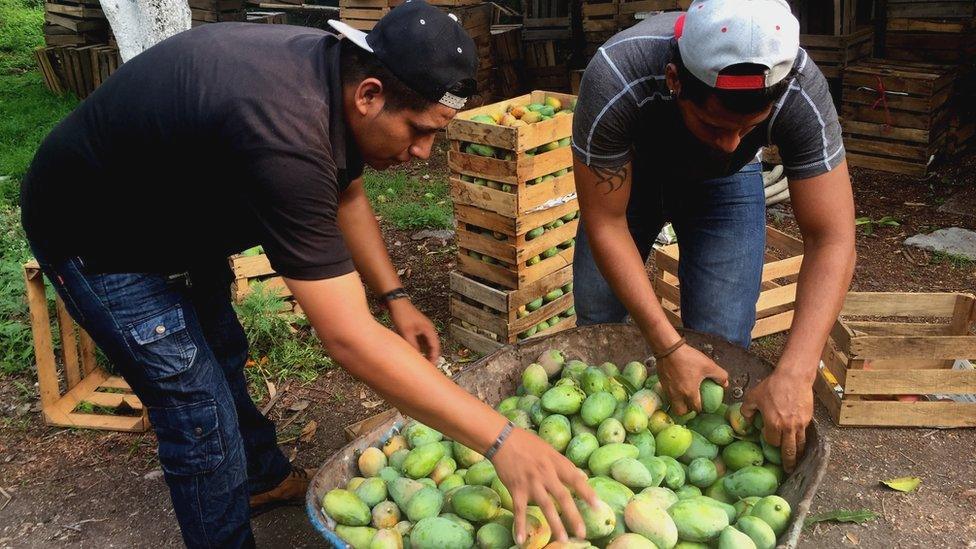
According to Mr García, workers and landowners alike will vote for Andrés Manuel López Obrador
That is why, he says, they are going to vote for the left-wing former mayor of Mexico City, Andrés Manuel López Obrador.
Mr López Obrador, who comes from a tiny village in the state of Tabasco, has a solid base among Mexico's rural poor.
He is a refreshing prospect for millions of ordinary voters, who are tired of battling against a stagnant economy only to see others enrich themselves through widespread corruption, Mr García explains.
'Mafia of power'
A few hours later, Mr López Obrador, who most Mexicans simply refer to as AMLO, arrives in Iguala.
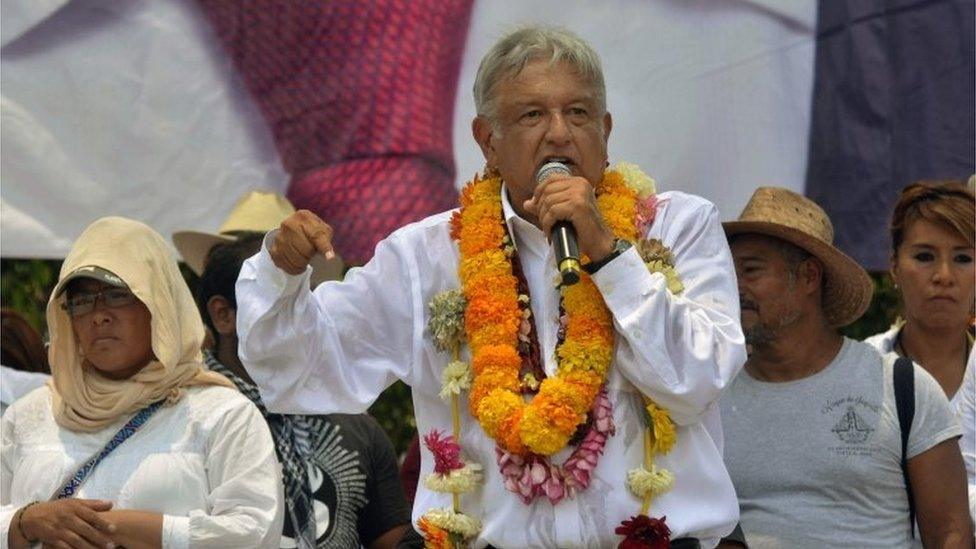
Andrés Manuel López Obrador is leading in the polls
The crowd at the rally has shown admirable patience in the sweltering heat after an accident on the main highway delayed the presidential candidate by almost three hours.
"Justice is like this sometimes: it takes its time but it comes eventually," he tells his audience.
The "justice" he is referring to is what polls are predicting will be his almost-certain victory on 1 July following two unsuccessful attempts at running for the presidency in 2006 and 2012.
After his 2006 defeat, which saw him lose by fewer than 250,000 votes, AMLO and his supporters took over the main thoroughfare in Mexico City in protest, causing the capital to grind to a halt for weeks.
On stage in Iguala, Mr López Obrador, who is standing for a new party called Morena, wastes little time in setting out the central plank of his electoral platform.
"Have faith, we're going to win and begin the complete renovation, regeneration and transformation that our country needs," he says to ecstatic applause and chants of "Presidente! Presidente!" from the crowd.

Mexico's presidential election

To be held on 1 July
Winner will replace President Enrique Peña Nieto from the Institutional Revolutionary Party (PRI)
In Mexico, presidents are restricted to a single six-year term, so Mr Peña Nieto cannot run again
Polls suggest left-wing candidate Andrés Manuel López Obrador has a big lead over the rest of the field
Three more candidates are in the running: right-left coalition leader Ricardo Anaya, governing party candidate José Antonio Meade and independent Jaime Rodríguez

He says that "the mafia of power", a term he uses frequently to describe the entrenched economic and political elites that have ruled Mexico for decades, will be "purged".
It is a well-received line among much of the public as Mexico ranks 135th out of 180 countries according to Transparency International's corruption perceptions index.
Soon he is rattling off further promises such as that he will draw a salary less than half that of President Peña Nieto, and that he will not live in the official residence of Los Pinos.
He says that the presidential plane will be sold and that senators will see their wages drastically cut. Teachers, doctors, nurses, police officers and soldiers will all earn more as a result, he insists.
'In touch'
"López Obrador has an extraordinary ability to connect with Mexican emotions," says political analyst Jesús Silva-Herzog.
Following a presidency in which great economic growth was promised but never materialised, "that emotion is basically rage against the political system and their management of the economy".
That connection can be felt at the rally in Iguala, where each of Mr López Obrador's proposals is greeted with more whooping and cheering.
Mr López Obrador is painted as a populist and a maverick by his opponents but at this rally people seem convinced he is serious about tackling the systemic corruption and impunity in Mexico.
Iguala is the birthplace of the Mexican flag, but these days it is notorious for a much darker reason. In late 2014, 43 trainee teachers were abducted from the town by local police.
Mid-way through AMLO's speech, their families invade the stage holding photos of their loved ones.
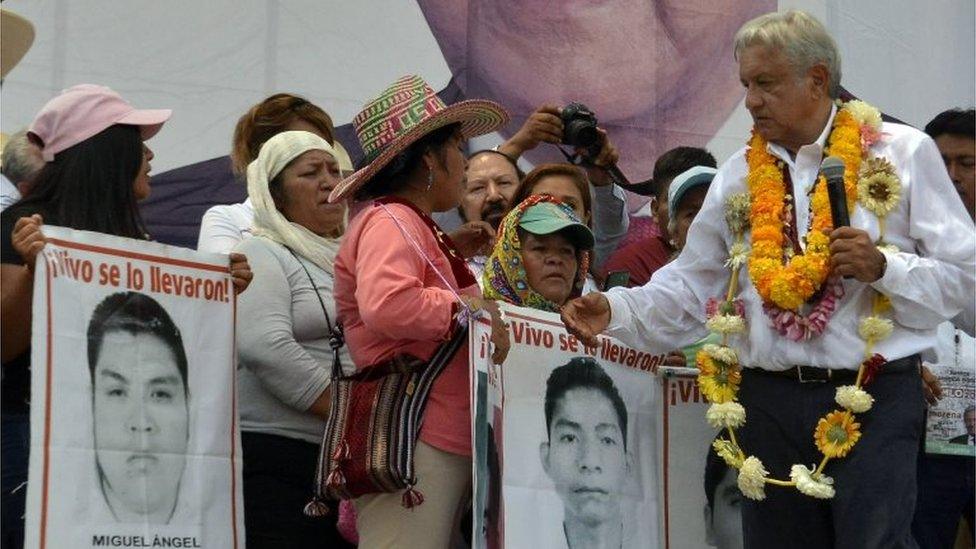
Relatives of the missing 43 students want AMLO to reopen the case
To this day, only the remains of one of them have been found and identified. The others remain missing.
"We don't know if he'll be different until he actually wins", says Mario César González, the father of one of the 43, after AMLO's rally.
"What we do know is that he has committed to reopening the investigation into case of the 43."
Spike in violence
This election is taking place in Mexico's most violent year in decades. It is one of the key reasons, alongside the ingrained corruption, the electorate is hungry for change.
The long tentacles of organised crime in Mexico can even be felt amid the gentle breeze of Mr García's mango fields.
Mr García's father was kidnapped by a criminal gang in 2008. After negotiating with the gang, the family managed to secure his release but he died the following year.
"I think the shock was too much for him," explains his son quietly.
"People are tired. We hit rock-bottom under this government but we're not going to tolerate it any longer," he says.
- Published30 May 2018
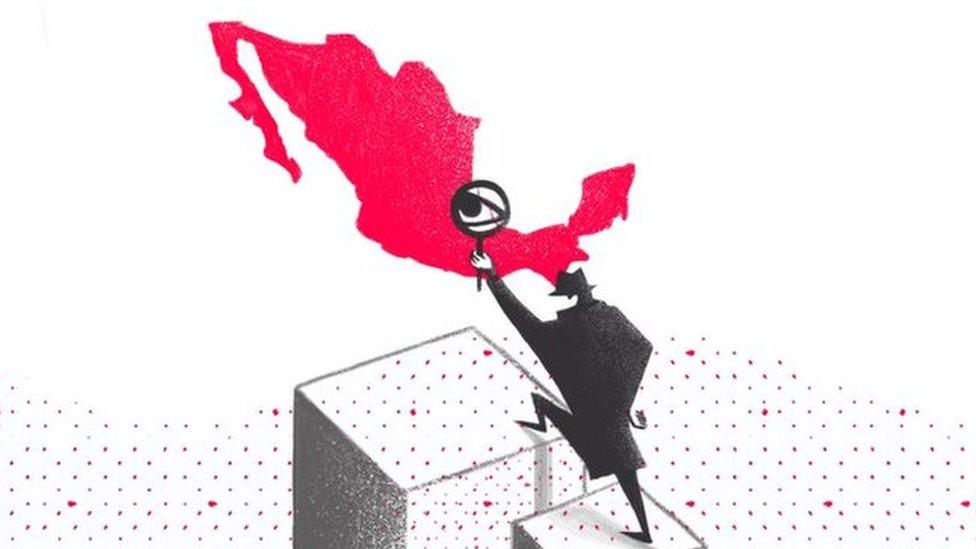
- Published24 October 2019
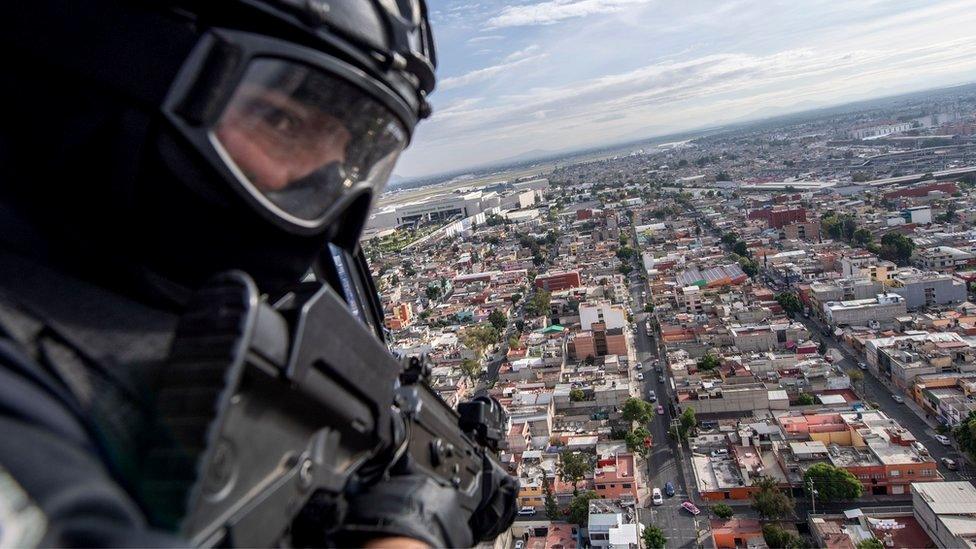
- Published13 March 2018
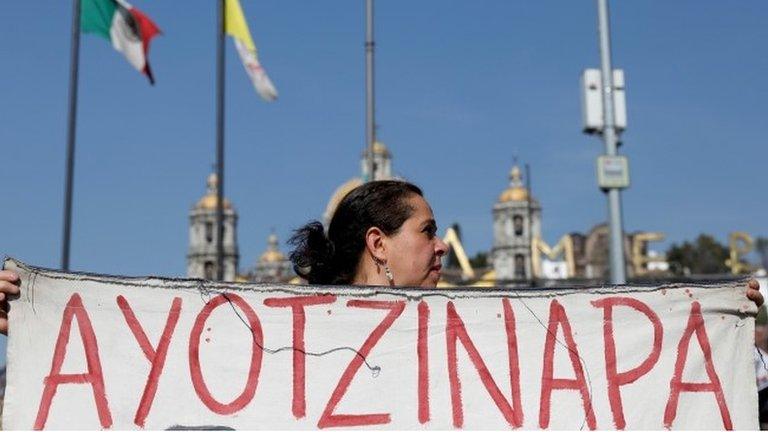
- Published9 March 2018
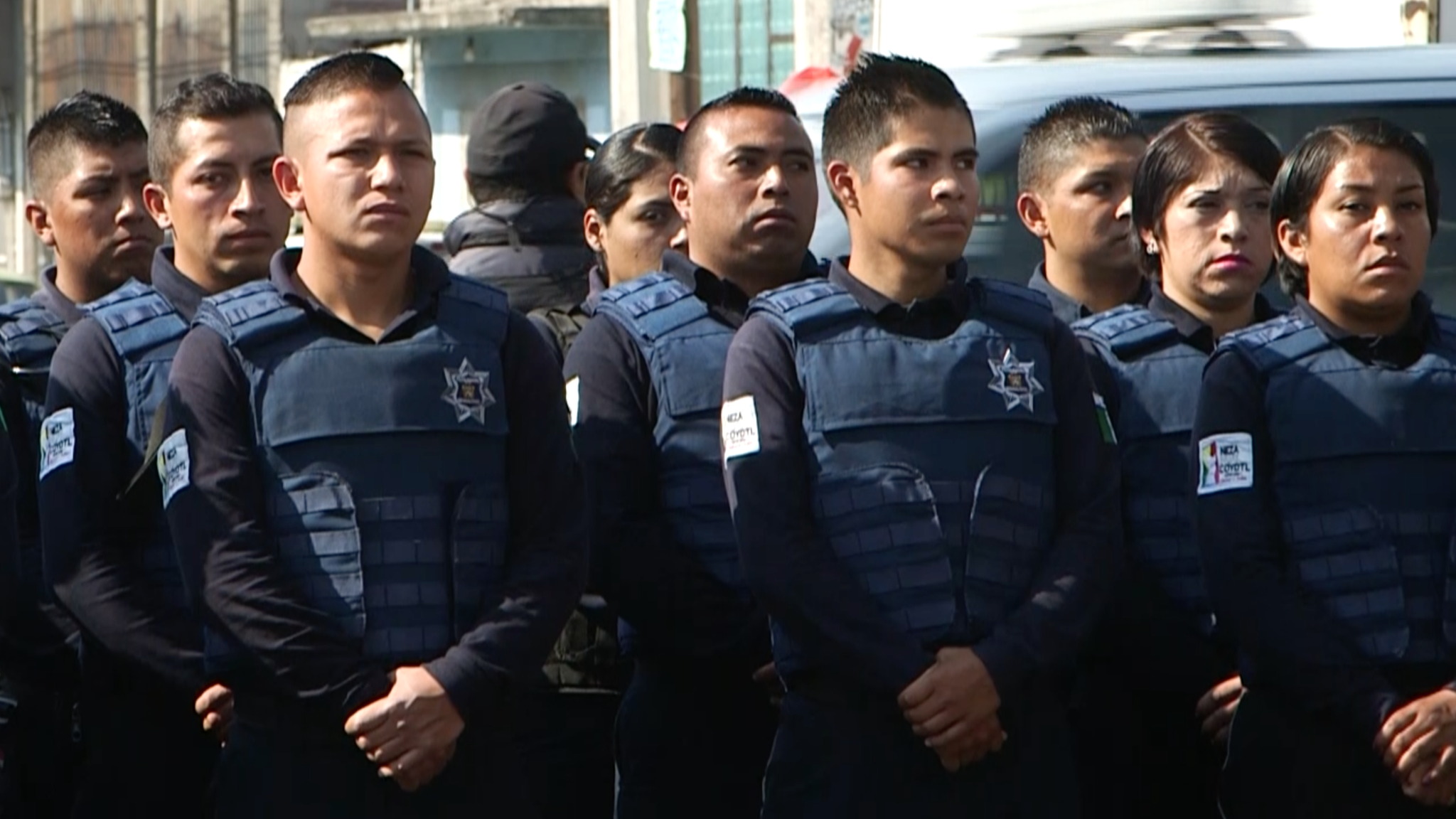
- Published25 January 2018
